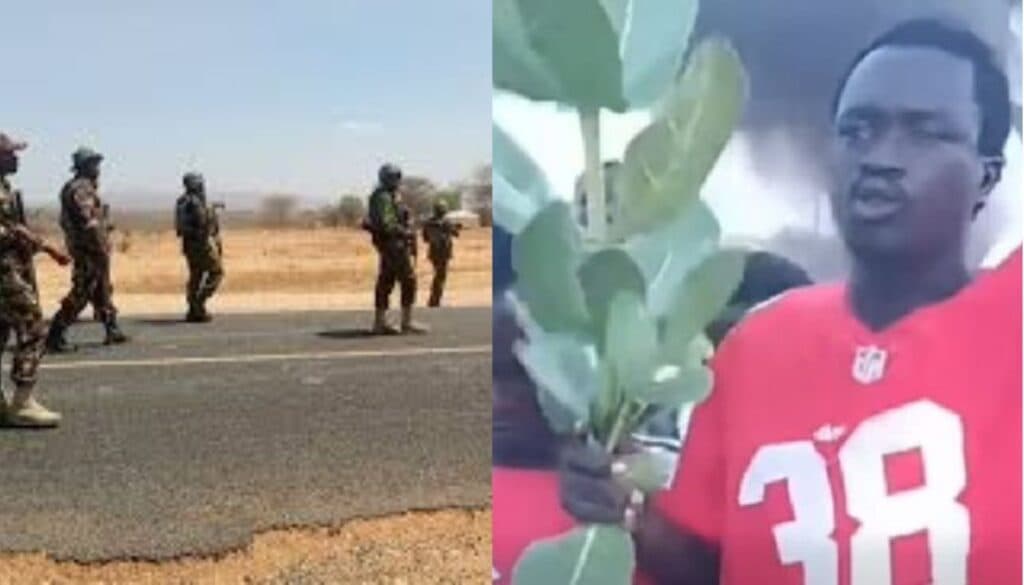We're loading the full news article for you. This includes the article content, images, author information, and related articles.
The killing of two National Police Reservists, allegedly by Kenya Defence Forces soldiers, has ignited protests in Turkana South and exposed critical coordination failures within the multi-agency security operations in the volatile North Rift region.

An anti-banditry security operation in Turkana South has become the centre of a major controversy following the killing of two National Police Reservists (NPRs) on the night of Wednesday, October 22, 2025. Kenya Defence Forces (KDF) soldiers are accused of shooting the two officers, sparking outrage from local communities and leaders who are now demanding a full investigation and accountability.
The deceased officers, identified as Eyapan Loluk and Simon Lomowas Okaru, were reportedly returning from their post guarding the Lokwar Irrigation Scheme, a KSh 40 million county government project in Kaputir. According to multiple accounts, including from local officials, the two were in full uniform, carrying their government-issued G3 rifles, and riding a motorcycle when they were confronted by KDF soldiers on patrol from the Loyapat camp.
Eyewitnesses claim the reservists identified themselves and surrendered to the KDF patrol before they were shot. The incident has left the community in shock, with the two officers leaving behind four widows and a total of 27 children. Simon Lomowas had three wives and 18 children, while Eyapan Loluk had one wife and nine children.
The killings triggered immediate protests, with angry residents blocking the main Kitale–Lodwar Highway with stones and burning tyres on Thursday, October 23, 2025, disrupting transport and demanding justice.
Turkana's political leadership has strongly condemned the incident, framing it as a catastrophic failure of coordination within the multi-agency security framework intended to restore peace in the North Rift. Speaking on Friday, October 24, after visiting the bereaved families, Governor Jeremiah Lomorukai labelled the killings as “reckless actions” that undermine peace efforts. He confirmed that he had personally raised the issue with President William Ruto, highlighting a “confusion in command” that is derailing the anti-banditry campaign, known as Operation Maliza Uhalifu.
“We need coordinated operations, not internal killings,” Governor Lomorukai stated, stressing that the KDF appeared to be sidelining other local security agencies and leaders. He questioned why soldiers deployed to fight bandits were now turning on the very reservists who possess critical local knowledge and act as the first line of defence for their communities.
Other leaders, including Turkana Woman Representative Cecilia Asinyen Ishuu and Turkana South MP John Ariko, echoed these sentiments. Ishuu described the killings as “unacceptable and barbaric,” noting that evidence recovered from the scene pointed to KDF involvement. MP Ariko called the deaths “senseless and heartbreaking” and questioned the KDF's role in becoming a “source of fear” for the community they are mandated to protect.
The national government has acknowledged the incident and promised an inquiry. Turkana South Deputy County Commissioner Gideon Ombongi assured residents on Friday, October 24, that a thorough investigation would be conducted and urged for patience. However, the jurisdictional complexities of the investigation are already apparent. Turkana County Police Commander John Tarus stated that the National Police Service (NPS) cannot lead the probe, as the matter involves the military. “Investigations into the killings of the police reservists are beyond the mandate of the National Police Service (NPS). The KDF is handling the matter,” Tarus was quoted as saying on Tuesday, October 28.
As of Wednesday, October 29, 2025, the KDF had not issued a formal public statement regarding the allegations, although senior officers in the region had indicated one was forthcoming. The incident raises serious questions about the rules of engagement and the command structure of joint security operations in Kenya. The reliance on NPRs, who are recruited locally, is crucial for intelligence gathering and navigating the difficult terrain of the North Rift. This event threatens to shatter the trust between national security organs and local communities, a vital component in the fight against endemic banditry and cattle rustling in the region.
Keep the conversation in one place—threads here stay linked to the story and in the forums.
Sign in to start a discussion
Start a conversation about this story and keep it linked here.
Other hot threads
E-sports and Gaming Community in Kenya
Active 9 months ago
The Role of Technology in Modern Agriculture (AgriTech)
Active 9 months ago
Popular Recreational Activities Across Counties
Active 9 months ago
Investing in Youth Sports Development Programs
Active 9 months ago
Key figures and persons of interest featured in this article